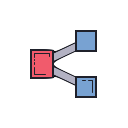Overview:
TheRead JSON block simplifies the extraction of specific values from a JSON object, enabling efficient data analysis, reporting, and preprocessing in data pipelines.
Inputs & Outputs
| I/O | Feature | Type | Simple Explanation |
|---|---|---|---|
| input | keys | string | A list of comma-separated keys to specify which values to extract from the JSON object. |
| input | json | object | The source JSON object containing the data you want to extract values from. |
| output | json_values | string | A consolidated string of all extracted values corresponding to the specified keys in the JSON data. |
Use Cases
Here are practical scenarios where this block can be incredibly useful:- Data Extraction: When operational teams require specific information (like sales figures or customer details) from complex JSON responses received from APIs, this block enables straightforward retrieval.
- Data Analysis: If your analytics team needs to pull certain metrics (like clicks or conversions) for deeper insights without dealing with every part of a verbose dataset, this tool streamlines that process.
- Reporting Needs: For creating reports based on key performance indicators gathered in a structured format like JSON, use this block to focus on only the relevant parts for your stakeholders.
- Data Pipeline Preprocessing: In environments where you manage incoming data flows that may include redundant information or excessive detail (such as logs), utilizing this feature allows for efficient slicing down to essential elements needed for further processing.
Read JSON block proves invaluable!